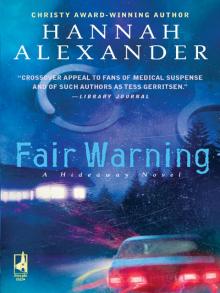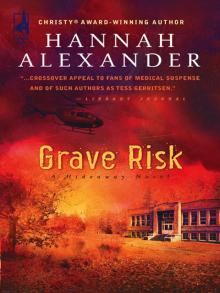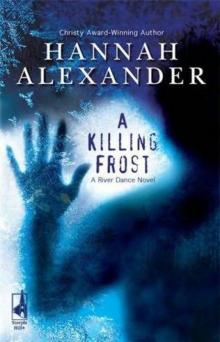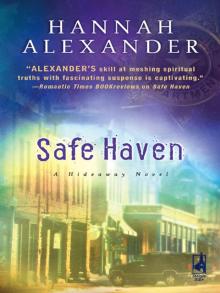- Home
- Hannah Alexander
Eye of the Storm
Eye of the Storm Read online
You can run, but you can’t hide
After one of her patients is murdered, Dr. Megan Bradley has to get away. Away from the crime she saw but couldn’t prevent, and away from missionary Gerard Vance, who almost made her trust in love again. Shaken and scared, Megan flees to the one place she can heal—her small Missouri hometown. She never expected Gerard to follow her…or for danger to find her again. When they discover a murderer lurks in town, Megan will need strength from Gerard—and the Lord—to save lives. Including their own.
“You need time from the memories, Megan,” Gerard said. “You need someone to listen. Help. Support.”
“And that would be you, of course.”
“Exactly. Have the nightmares stopped since you arrived here?”
Megan turned away. “Please, I’m not ready for this. I can’t—” She shoved away from the post. There was the sadness again, not only in her eyes, but in every inch of her body.
“Kirstie told me about her blackouts,” Gerard said. “Did she mention to you that she was afraid she was being poisoned?”
Megan’s expression froze, her eyes darkened with shock. “She told you that? Why didn’t she say something to me about it?”
“You refused to take her case.”
“Of course I did. She needs a neurologist.”
Gerard shook his head. “You still think that?”
Megan raised an elegantly arched brow. “What would you say if I told you she warned me recently that I could be in danger?”
Books by Hannah Alexander
Love Inspired Suspense
*Note of Peril
*Under Suspicion
*Death Benefits
Hidden Motive
Season of Danger: “Silent Night, Deadly Night”
Eye of the Storm
Love Inspired Historical
*Hideaway Home
Love Inspired Single Title
*Hideaway
*Safe Haven
*Last Resort
*Fair Warning
*Grave Risk
*Double Blind
A Killing Frost
**Sacred Trust
**Silent Pledge
**Solemn Oath
*Hideaway
**Sacred Trust
HANNAH ALEXANDER
is the pseudonym of husband-and-wife writing team Cheryl and Mel Hodde (pronounced “Hoddee”). When they first met, Mel had just begun his new job as an E.R. doctor in Cheryl’s hometown, and Cheryl was working on a novel. Cheryl’s matchmaking pastor set them up on an unexpected blind date at a local restaurant. Surprised by the sneak attack, Cheryl blurted the first thing that occurred to her: “You’re a doctor? Could you help me paralyze someone?” Mel was shocked. “Only temporarily, of course,” she explained when she saw his expression. “And only fictitiously. I’m writing a novel.”
They began brainstorming immediately. Eighteen months later they were married, and the novels they set in fictitious Ozark towns began to sell. The first novel in the Hideaway series won the prestigious Christy Award for Best Romance in 2004.
Hannah Alexander
Eye of the Storm
He stilled the storm to a whisper;
the waves of the sea were hushed.
—Psalms 107:29
Eye of the Storm is dedicated to the Jolly Mill Park Foundation, a group of people who unselfishly give of their time, energy and finances to keep Jolly Mill Park active and remind us of its fascinating history.
We very much appreciate the permission we were given to bring the tiny town of Jolly Mill alive and populate it with more buildings, more people, more suspense than typically takes place in this beautiful setting. Readers are wholeheartedly invited to come visit the real Jolly Mill and explore reminders of its long history. Prepare for a taste of the actual history of this town in upcoming historical titles about the Village of Jollification.
Contents
Chapter One
Chapter Two
Chapter Three
Chapter Four
Chapter Five
Chapter Six
Chapter Seven
Chapter Eight
Chapter Nine
Chapter Ten
Chapter Eleven
Chapter Twelve
Chapter Thirteen
Chapter Fourteen
Chapter Fifteen
Chapter Sixteen
Chapter Seventeen
Dear Reader
Questions for Discussion
ONE
A silver blade sliced through the curtained exam room, its target the helpless patient of Dr. Megan Bradley. The hand that held the blade was crusted with grime, fingernails whitening as it squeezed the handle with the force of fury. Megan clutched the cold steel of a revolver in her hand, aimed it at the faceless attacker’s chest and pulled the trigger.
No burst came from the chamber. No sound touched her at all. She tried to scream. Silence. The blade reflected Megan’s contorted features as it plunged downward again. The pressure of her scream threatened to explode from her chest. She fought her way out of the silent nightmare of a Corpus Christi rescue mission clinic and into her soft bed in the darkness of her tiny cabin in the Missouri woods.
“No!” She battled the blankets and sat up, still seeing the sweet, dark-haired young homeless woman with the huge belly. “Oh, Joni, no.”
Megan squeezed her eyes shut at the hideous memory that repeated itself far too often at night…the killer ripping his way through the curtained cubicle…the blood…the screams mingling with the recoil of Megan’s weapon as the loud report deafened her. She watched the grimy killer hit the floor, splattering blood and ripping a section of the curtain from the ceiling. And then she slid through the blood to Joni’s side to find the young woman’s eyes staring into nothing.
Gerard Vance rushed into the ruined cubicle, his head brushing the rails that held the curtain, his shoulders framing him as he entered. At the sight of Joni, his face filled with grim pain. He dropped to his knees at Megan’s side without a glance at the dead man tangled in the fallen curtain. “I’ve got your back, Megan. Don’t look at him. Let’s get the baby out.”
With his aid, Megan held her tears and controlled her hands, performing a postmortem C-section, sickened by the desecration of her sweet young patient’s body. The cry of little Daria, Joni’s orphan, soon filled the clinic, the sound of life echoing past her young mother’s death.
Megan forced away the malignant memory, forced herself to breathe slowly, forced her eyes to open. She brushed the hair from her face and focused on her surroundings, anything but the reason she’d fled Corpus Christi. A slight breeze outside moved a tree branch across the window beside her bed—a lifeline to reality. A trickle of moisture drew her fingers to her neck; she touched the droplets of perspiration.
She blinked slowly and in that brief moment she was attacked once more by the memory of her own contorted features in the killer’s knife blade, like a misshapen mirror. The dregs of the nightmare mingled with reality.
She flung the blanket from her legs and leapt from the bed. “Wake up,” she muttered into the chilly one-room cabin. “Stop this. You’re doing it to yourself, Megan.”
Talking to herself, yes, but even the sound of her own voice helped break the spell. Inhaling deeply and then exhausting her lungs of air, as if she could cleanse her system of the weight of knowledge with the carbon dioxide, she kept her attention on the movement of that one branch outside the nearest
window. Though gray in the night, she knew she would see the green color of life when the sun rose. Focus on the hope of dawn.
“It isn’t happening,” she whispered into the cool air. “Not now. It’s over.” The nightmare receded with great reluctance, but left behind emptiness. How long would she live with these terrors?
Distracted at last by the gray-and-black silk of nighttime in the forest, Megan sank back onto the bed. The softness of the mattress reproached her despite the good intentions of Kirstie and Lynley Marshal, the dear friends who had furnished this hideaway for her two weeks ago. Her patient, Joni Park, was relegated to the grave, separated from her baby forever. What had the surviving doctor done to deserve such luxury?
“I failed,” Megan whispered to the room. All those months she’d carried a weapon to protect the helpless, but when a knife ripped through that curtained enclosure, she’d been unable to do a thing. There’d simply been no warning.
The peeping of tree frogs drifted in through the mass of windows in the cottage’s front wall. Megan willed the sound to wash over her and clear away the hovering menace. These were safe Missouri sounds, not the setting of her recurrent dreams. It was a rent-free cottage just past the outskirts of the village of Jolly Mill, near the bank of Capps Creek. So why did she continue to dwell in that hot place of dread every night when she closed her eyes?
Cool air chilled the moisture of her skin; her shivering returned, this time as much from cold as from lingering memories. She stood up again, allowing her bare feet to conform to the ridges of the old wooden floor before she checked the lighted numbers of the alarm clock. It was five in the morning. Upon her return to her childhood hometown, she’d put an end to her practice of rising before the sun and studying her latest medical journals or a new textbook.
She’d put an end to several old habits, hoping the change would bring about at least the impression of healing. Nothing worked. Old habits didn’t like to be abandoned. Though her sleep aid had gotten her through the past two weeks, last night’s dose seemed to have developed a shorter half-life.
Her heart continued its tachycardic rhythm. She pulled on her warm terry robe, rubbing her arms with her hands as she stepped to the multi-paned window in the front door of the cottage. How many times since Joni’s murder had she considered getting therapy?
But shouldn’t she know the drill after working with so many patients at the Vance Rescue Mission? She wasn’t living on the street or battling psychosis or alcoholism or drug addiction. Couldn’t she work this out for herself?
Still, the foreboding persisted as every creak of the cottage, every odd sound outside, instead of comforting her, sent a fresh chill through her. Maybe resuming her habit of early-morning study would be a good distraction.
She stepped around the red antique room divider, tugging the collar of her robe more closely around her neck as she glanced around the room. The furnishings so generously provided to her by her tiny group of longtime girlfriends were barely outlined by the gentle glow of moonlight that drifted down through the treetops and through the windows.
She went to the kitchenette for a drink of water, her shadow faint against the sand-colored walls of the one-room cottage—a hue that reminded her too much of the place from which she’d fled.
Megan seldom concerned herself with the appearance of her surroundings. The recent flurry of decorating—the red divider, the Roman shades over the multiple windows across the front of the cottage—had been Kirstie Marshal’s idea. When thinking clearly, Kirstie was good with a hammer and screwdriver. The love seat in the tiny sitting area had come from Nora Thompson’s own home. This cottage was Thompson property.
As a teenager, Megan once dreamed of living in this very cottage, so deep in the woods, so isolated from the world…but of course, not far from Alec Thompson, the boy she’d had a crush on since fifth grade. Most times, she loved the peace of this place. Though Alec no longer lived in the family home with his mother, Megan took comfort in knowing that Nora was still barely two hundred yards through the woods in the big house on the cliff above the creek.
Five in the morning, however, wasn’t a good time to call Nora to come running down the hill with hot cocoa and a dozen of her famous black walnut–butterscotch cookies. Megan saw Jolly Mill as a place of comfort, but she also saw it as personal failure. She hadn’t even been able to face a full two years of real life in the trenches.
Here, everyone in town knew her by her first, middle and last names, and some could recall the subject of her valedictorian speech on graduation night. She had old friends and classmates who’d lingered in Jolly Mill to carry on the family businesses, to settle with their own families and continue a long tradition of farming. They weren’t hiding here—they were living here.
She was hiding.
The sleeping pill had made her thirsty during the night, and she swigged down the whole glass of water and poured another, listening to the music of the peepers and the breeze that gently rustled through the spring leaves outside. The faint sound of a small motor kicking on in the pump house to replace the water she’d poured. It kicked off just as quickly.
A quiet melody took its place and it took her a few seconds to recognize the tone of her new cell phone. It grew louder as she listened, shooting through the cottage. She stiffened. A phone call in the dark had always been her least favorite sound.
Her legs felt stiff as she rushed to the phone, then answered and peered out at the foggy, moonlit haven that surrounded the cottage.
“Lynley?”
“Thank goodness.” Her best friend’s voice, normally brisk and filled with energy, sounded tight and raspy through the receiver.
“What is it?”
“Mom’s disappeared again and this time I haven’t been able to find her.”
Megan turned from the window. No. Not again. Poor Kirstie. “How long has she been missing?”
“Maybe all night. I can’t believe I didn’t check on her, but she was doing so well the past few days and I was studying late. I remember laughing with her because she teased me about what she should call me when I got my doctorate in nursing. She named me Dr. Nurse Marshal. I was tired and I thought she’d gone to bed, and I fell asleep—”
“Lynley, calm down,” Megan said. “Call some neighbors and ask them to help search. She may have taken shelter in a barn again until it gets light enough for her to find her way home.”
“I’ve already called everyone whose land adjoins ours. No one’s found her. I know they’re getting tired of my calls, though Elmer Batschelet offered to use his dogs to track her. I’ll probably take him up on it if she doesn’t show up soon. Do you know how many times this has happened in the past month?”
Megan took her lower lip between her teeth. Now was not the time for recriminations, but couldn’t Lynley see the obvious? “This makes the second since I’ve arrived.” An average of once a week.
“It’s getting worse.”
“Have you called the sheriff?” Megan asked.
“He and his men are out searching. Again. Poor Sheriff Moritz. And poor Mom. She’s always so embarrassed when this happens.”
“We can help her deal with the embarrassment later. First get her safely home.” Megan stretched. “When she shows up, bring her by the clinic so we can check her out.”
“I’ll be in for work as soon as I find her.” There was a sigh. “If I do. If she’s okay. I doubt she’ll be in shape to even answer phones today.”
Megan allowed those statements to linger. Maybe Lynley would talk herself into doing the right thing and prevent a quarrel that neither of them wanted right now. Kirstie’s daughter needed to see reason before Kirstie got hurt.
“Megan?” The voice was tentative, almost as if Lynley could hear Megan’s thoughts. And she probably could. They’d known each other from th
e cradle. “What if she doesn’t come back this time?”
Instead of reassuring her friend as she had been doing since Kirstie’s mysterious episodes began last month, Megan pressed her lips together. It was a good question. Maybe Lynley needed to follow it to its logical conclusion and start dealing with the dangers of her state of denial.
“Megan?”
“I don’t know, but you can’t keep trying to do this alone.” Megan felt awful as she spoke the words, but as Kirstie herself had said, her daughter wouldn’t listen to reason. “You need help.”
“We just need to get through this until we figure out what’s really causing the problem.”
Megan forced a gentleness to her voice. “Then if you won’t accept help, place her into protection until we do get it figured out.”
“Protection?” There was a soft snort. “You mean imprison her, don’t you?”
“I mean arrange it so this doesn’t happen again.”
“Megan, she’s a vital, active, fifty-two-year-old woman, not someone accustomed to sitting in a rocking chair or being cooped up in a block of rooms. You think she deserves to be locked up in a nursing home?”
“I don’t think she deserves Alzheimer’s, but—”
“Don’t say that! I hate that word. You know as soon as that diagnosis is made and the patient is shoved into a lockdown ward, no one ever searches for other causes, they just treat the symptoms. I’m not giving up on her that easily.”
“I’m not telling you to give up.”
“This isn’t sundowner’s syndrome.”
Megan couldn’t miss the increasing tautness of Lynley’s voice. “It’s okay,” she told her friend. “You’re not alone in this. I’m here for you.”
There was a brief silence and then “How? You wouldn’t move in with us.”
Shame attacked Megan. She didn’t have the strength to explain yet. “I’ll do all I can to help you and Kirstie through it.”

 Silent Pledge
Silent Pledge Eye of the Storm
Eye of the Storm Fair Warning
Fair Warning Double Blind
Double Blind Grave Risk
Grave Risk Hideaway Home
Hideaway Home Death Benefits
Death Benefits Note of Peril
Note of Peril Hideaway
Hideaway Solemn Oath
Solemn Oath The Wedding Kiss
The Wedding Kiss Last Resort
Last Resort Sacred Trust
Sacred Trust A Killing Frost
A Killing Frost Safe Haven
Safe Haven